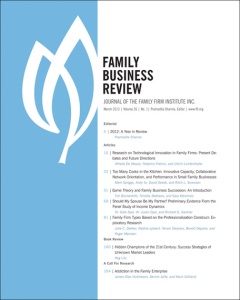Employee Innovation in Family Business Environments
 [Editor’s Note: We are pleased to welcome Yannick Bammens, Guy Notelaers, and Anita Van Gils who collaborated on their article entitled “Implications of Family Business Employment for Employees’ Innovative Work Involvement,” available now in the OnlineFirst Section of Family Business Review.]
[Editor’s Note: We are pleased to welcome Yannick Bammens, Guy Notelaers, and Anita Van Gils who collaborated on their article entitled “Implications of Family Business Employment for Employees’ Innovative Work Involvement,” available now in the OnlineFirst Section of Family Business Review.]
It is generally accepted that innovation is critical for the continued growth and vitality of organizations and economies, and scholars have started to explore how family influence in organizations may affect innovation-relevant issues. Recent studies indicate that family businesses generally favor incremental over radical innovations, and that they actually outperform other organizational forms with respect to such incremental or exploitative innovations. Yet, little is known about the processes through which family businesses pursue incremental innovations and why they may be better at it than organizational forms without family influence. The purpose of this study is to shed further light on this intriguing question by examining one possible explanation related to the role of employees’ spontaneous innovative work involvement as an internal informal source of incremental innovation.
Our study reveals that employees who work at a family business indeed show higher levels of spontaneous involvement in informal innovation activity compared to employees active in organizations without family influence. It appears that family businesses have strengths with respect to the fostering of an innovation-supportive work climate, in which employees feel genuinely cared for and encouraged to contribute to organizational performance with their creative ideas and suggestions for improvement. In other words, our study suggests that family businesses have advantages with regard to internal informal paths leading to innovation outputs that are largely incremental or exploitative in nature. These findings complement prior research which mainly highlighted family-based weaknesses and limitations regarding internal formal innovation inputs (R&D expenditures), external innovation inputs (open innovation collaborations) and radical innovation outputs. As such, family businesses may serve as an example for those organizations interested in fostering a more innovation-supportive work climate that helps unleash the innovation potential of its workforce.
Read “Implications of Family Business Employment for Employees’ Innovative Work Involvement,” in Family Business Review. For notifications on articles like this, click here to sign up for e-alerts from Family Business Review.
Yannick Bammens, PhD, is an assistant professor of management at Maastricht University, the Netherlands. His current research centers on innovation management and corporate governance in the setting of founder- and family-led enterprises. His research has been published in journals such as Journal of Management, International Journal of Management Reviews, Small Business Economics, Journal of Business Ethics, and Journal of Small Business Management.
 Guy Notelaers, PhD, is an associate professor of work and organizational psychology at University of Bergen, Norway.He has published on the dark side of management and counterproductive workplace behaviors, such as workplace bullying, in journals such as Work and Stress, British Journal of Management, European Journal of Work and Organizational Psychology, and Economic and Industrial Democracy.
Guy Notelaers, PhD, is an associate professor of work and organizational psychology at University of Bergen, Norway.He has published on the dark side of management and counterproductive workplace behaviors, such as workplace bullying, in journals such as Work and Stress, British Journal of Management, European Journal of Work and Organizational Psychology, and Economic and Industrial Democracy.
 Anita Van Gils, PhD, is an associate professor of entrepreneurship at Maastricht University, the Netherlands, and a member of the executive board of IFERA. Her research interests include strategic and organizational aspects of entrepreneurial, small to medium-sized and family businesses. Her research has been published in journals such as Corporate Governance: An International Review, International Journal of Management Reviews, Small Business Economics, Journal of Small Business Management, and International Small Business Journal.
Anita Van Gils, PhD, is an associate professor of entrepreneurship at Maastricht University, the Netherlands, and a member of the executive board of IFERA. Her research interests include strategic and organizational aspects of entrepreneurial, small to medium-sized and family businesses. Her research has been published in journals such as Corporate Governance: An International Review, International Journal of Management Reviews, Small Business Economics, Journal of Small Business Management, and International Small Business Journal.

























































































